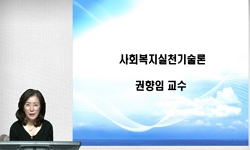조익의 수양론에서 두드러지는 관점은 실천을 강조하는 것이다. 조익의 수양은 크게 경(敬) 과 경술(經術)로 나뉘는데, 둘 모두에서 이러한 관점이 드러난다. 우선 존양과 성찰로 구성되는 ...
http://chineseinput.net/에서 pinyin(병음)방식으로 중국어를 변환할 수 있습니다.
변환된 중국어를 복사하여 사용하시면 됩니다.
- 中文 을 입력하시려면 zhongwen을 입력하시고 space를누르시면됩니다.
- 北京 을 입력하시려면 beijing을 입력하시고 space를 누르시면 됩니다.

포저 조익의 경학사상에 나타난 수양관 -논어천설을 중심으로- = Jo Ik’s Theory of Self-Cultivation Approached by His Interpretation of Confucian Classics: Focusing on the Lunyu qianshuo
한글로보기https://www.riss.kr/link?id=A105434262
- 저자
- 발행기관
- 학술지명
- 권호사항
-
발행연도
2018
-
작성언어
-
-
주제어
조익 ; 수양 ; 경(敬) ; 경술(經術) ; 실천 ; 사욕 ; Jo Ik ; moral cultivation ; jing 敬 (scrupulous attention) ; jingshu 經術 (study of the classics) ; practice ; selfish desire
-
KDC
810
-
등재정보
KCI등재
-
자료형태
학술저널
-
수록면
85-111(27쪽)
-
KCI 피인용횟수
0
- DOI식별코드
- 제공처
- 소장기관
-
0
상세조회 -
0
다운로드
부가정보
국문 초록 (Abstract)
조익의 수양론에서 두드러지는 관점은 실천을 강조하는 것이다. 조익의 수양은 크게 경(敬) 과 경술(經術)로 나뉘는데, 둘 모두에서 이러한 관점이 드러난다. 우선 존양과 성찰로 구성되는 경은 표면적으로는 존양이 중시되지만 내 외면을 아우르는 성찰을 통해 존양을 이룬다는 점에서 실제적으로는 성찰이 중시된다. 이때 성찰은 사욕으로 인한 잘못을 경계하는 성격이 짙어서 실천적 맥락이 강하다. 경술이 앎과 행위를 아우르며 그 최종 목표가 행위에 놓인다는 점에서도 실천적 맥락을 지적할 수 있다. 행위에 관한 수양이 경술의 연장선상에서 다뤄지므로 행위 규범으로서 예의 역할을 부각시키는 대신 사욕 제거를 통해 다다르게 될 최종 상태인 만물의 마땅한 위치를 예로 제시하는 경향이 강하다. 실천을 강조하는 조익의 수양관은 논어에서 경을 내적 태도에 국한시켜 해석하는 주희와 달리 외적 태도로까지 확장시키는 차이로 이어진다. 인간으로서 할 바를 다 한 후 학문을 익힐 것을 말하는 논어 1.6을 해석하면서도 조익은 실천만으로는 안 되고 학문으로 이를 뒷받침해야 한다는 것에 무게를 두는 주희를 따르는 한편, 학문보다 실천이 앞서는 경우도 있다는 것을 지적하며 실천 지향성을 보여 준다.이 외 사욕 경계와 만물이 지닌 마땅한 법칙으로서 예를 보는 관점을 부각시킨다. 실천을 강조 하는 수양론인 만큼 양명학에 경도된 듯한 해석도 있지만 주자학을 벗어났다고 평가하기보다는 주자학의 틀 안에서 실천이라는 자신의 주안점을 살리는 수양론을 구축했다고 평가하는 것이 더 적절할 것이다. 조익은 주자학에 대한 이해가 무르익은 가운데 양명학이 영향력을 펼치기 시작한 16세기 말 17세기 초 조선의 사상적 토양을 바탕으로 주자학 체계 내에서 실천을 강조한 수양관을 경학사상에 투영해 나간 학자로 평가할 수 있다.
다국어 초록 (Multilingual Abstract)
In Jo Ik’s theory, xingcha has strong practical connotations in that its meaning is closer to being alert to wrongful behaviors caused by selfish desire.
This practical connotation can also be pointed out in the study of the classics:
although this study pursues improvement both in knowledge and behavior, its ultimate goal is placed on behavior. Since the improvement of behavior is promoted in the study of the classics, the role of li 禮 as a norm of conduct is paid less attention. Instead, Jo Ik tends to present li as the proper positions of all things, which is the final state that will be achieved by eliminating selfish desire.
Jo Ik’s emphasis on practice in self-cultivation renders a differentiated interpretation of jing in the Lunyu from Zhu Xi’s: Zhu Xi mostly interprets jing as an internal attitude whereas Jo Ik shows a stronger tendency to expand its meaning to an outer attitude. When interpreting Lunyu 1.6, which says study comes after fulfilling one’s everyday duties as a human being, Jo Ik, on the one hand, follows Zhi Xi’s interpretation that puts emphasis on study: everyday duties are not properly carried out if not supported by study. On the other hand, Jo Ik stresses practice by indicating that there is a case in which practice is more urgent than study. Besides, Jo Ik emphasizes being wary of selfish desire and sees li as the proper principles of all things.
Since Jo Ik emphasizes practice, some of his interpretations are similar to Wang Yangming’s idea. However, we may reasonably place Jo Ik’s theory within Zhu Xi’s philosophical framework; Jo Ik explored Confucian classics reflecting his viewpoint on moral cultivation which puts special emphasis on practice, utilizing the academic soil of the Joseon dynasty during the late 16th and early 17th centuries when Wang Yangming’s doctrine began to exert influence under a mature understanding of Zhu Xi’s doctrine.
Jo Ik’s prominent view on self-cultivation is to emphasize practice. Jo Ik’s theory of self-cultivation is divided into two main areas: the execution of jing 敬 and the study of the classics (jingshu 經術), both of which emphasize practice. In ...
Jo Ik’s prominent view on self-cultivation is to emphasize practice. Jo Ik’s theory of self-cultivation is divided into two main areas: the execution of jing 敬 and the study of the classics (jingshu 經術), both of which emphasize practice. In executing jing which consists of cunyang 存養 and xingca 省察, what gets first priority is cunyang; however, in fact it is xingca that assumes real significance in that cunyang is achieved through xingca which encompasses inner and outer cultivation.
In Jo Ik’s theory, xingcha has strong practical connotations in that its meaning is closer to being alert to wrongful behaviors caused by selfish desire.
This practical connotation can also be pointed out in the study of the classics:
although this study pursues improvement both in knowledge and behavior, its ultimate goal is placed on behavior. Since the improvement of behavior is promoted in the study of the classics, the role of li 禮 as a norm of conduct is paid less attention. Instead, Jo Ik tends to present li as the proper positions of all things, which is the final state that will be achieved by eliminating selfish desire.
Jo Ik’s emphasis on practice in self-cultivation renders a differentiated interpretation of jing in the Lunyu from Zhu Xi’s: Zhu Xi mostly interprets jing as an internal attitude whereas Jo Ik shows a stronger tendency to expand its meaning to an outer attitude. When interpreting Lunyu 1.6, which says study comes after fulfilling one’s everyday duties as a human being, Jo Ik, on the one hand, follows Zhi Xi’s interpretation that puts emphasis on study: everyday duties are not properly carried out if not supported by study. On the other hand, Jo Ik stresses practice by indicating that there is a case in which practice is more urgent than study. Besides, Jo Ik emphasizes being wary of selfish desire and sees li as the proper principles of all things.
Since Jo Ik emphasizes practice, some of his interpretations are similar to Wang Yangming’s idea. However, we may reasonably place Jo Ik’s theory within Zhu Xi’s philosophical framework; Jo Ik explored Confucian classics reflecting his viewpoint on moral cultivation which puts special emphasis on practice, utilizing the academic soil of the Joseon dynasty during the late 16th and early 17th centuries when Wang Yangming’s doctrine began to exert influence under a mature understanding of Zhu Xi’s doctrine.
목차 (Table of Contents)
- 1. 서론
- 2. 조익 수양론의 두 축: 경(敬)과 경술(經術)
- 1) 경을 통한 사욕 제거
- 2) 경술을 통한 앎과 행위에 관한 공부
- 3. 논어천설에 담긴 조익의 수양관: 주희와 비교를 중심으로
- 1. 서론
- 2. 조익 수양론의 두 축: 경(敬)과 경술(經術)
- 1) 경을 통한 사욕 제거
- 2) 경술을 통한 앎과 행위에 관한 공부
- 3. 논어천설에 담긴 조익의 수양관: 주희와 비교를 중심으로
- 1) 외면으로 확장된 경: 실천 중시
- 2) 사욕과 천리
- 3) 당연한 법칙인 예
- 4. 결론
참고문헌 (Reference)
1 이상현, "국역 포저집 1" 민족문화추진회 2005
2 김성재, "浦渚 趙翼의 『論語淺說』 上 譯注" 2 : 2011
3 송석준, "浦渚 趙翼先生의 哲學思想-性理說과 陽明學" 4 : 1998
4 송석준, "浦渚 趙翼 儒學思想의 近代精神" 1 : 1993
1 이상현, "국역 포저집 1" 민족문화추진회 2005
2 김성재, "浦渚 趙翼의 『論語淺說』 上 譯注" 2 : 2011
3 송석준, "浦渚 趙翼先生의 哲學思想-性理說과 陽明學" 4 : 1998
4 송석준, "浦渚 趙翼 儒學思想의 近代精神" 1 : 1993
동일학술지(권/호) 다른 논문
-
‘학(學)’에서 ‘주의(主義)’로 이이와 송시열의 경서 이해
- 한림대학교 태동고전연구소
- 이경구
- 2018
- KCI등재
-
『논어』 “오여회언(吾與回言)”장(章)에 대한 조선의 주자학적 접근
- 한림대학교 태동고전연구소
- 강경현(姜卿显
- 2018
- KCI등재
-
- 한림대학교 태동고전연구소
- 심영환(Shim, Young Hwan)
- 2018
- KCI등재
-
- 한림대학교 태동고전연구소
- 김수경(Kim, Su-kyung)
- 2018
- KCI등재
분석정보
인용정보 인용지수 설명보기
학술지 이력
| 연월일 | 이력구분 | 이력상세 | 등재구분 |
|---|---|---|---|
| 2027 | 평가예정 | 재인증평가 신청대상 (재인증) | |
| 2021-01-01 | 평가 | 등재학술지 유지 (재인증) |  |
| 2018-01-01 | 평가 | 등재학술지 선정 (계속평가) |  |
| 2017-12-01 | 평가 | 등재후보로 하락 (계속평가) |  |
| 2013-01-01 | 평가 | 등재학술지 선정 (등재후보2차) |  |
| 2012-01-01 | 평가 | 등재후보 1차 PASS (등재후보1차) |  |
| 2011-01-01 | 평가 | 등재후보 1차 FAIL (등재후보1차) |  |
| 2010-08-31 | 학술지명변경 | 한글명 : 태동고전연구 제24집 -> 태동고전연구 |  |
| 2009-01-01 | 평가 | 등재후보학술지 선정 (신규평가) |  |
학술지 인용정보
| 기준연도 | WOS-KCI 통합IF(2년) | KCIF(2년) | KCIF(3년) |
|---|---|---|---|
| 2016 | 0.52 | 0.52 | 0.61 |
| KCIF(4년) | KCIF(5년) | 중심성지수(3년) | 즉시성지수 |
| 0.61 | 0.66 | 1.754 | 0 |




 eArticle
eArticle 스콜라
스콜라







